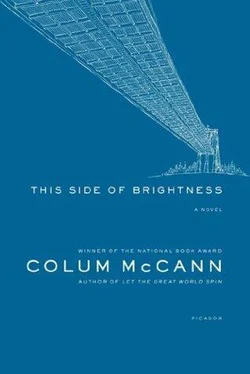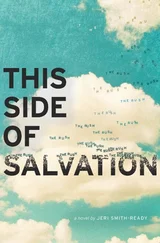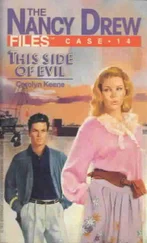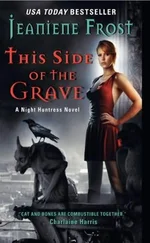“Very funny.”
“No,” he says, “no money.”
She folds the graph paper carefully and tucks it in her fur coat, winks at him, and then rubs her tongue along her lips. “I’m thirsty,” she says. “Goin’ to see the candy man.”
“Man,” he whispers after her. “Stay here.”
He watches her figure move in and out of the light shafts until she has gone, and after a moment he hears shouting from down near Elijah’s cubicle — maybe Angela has shown Elijah the map of her face with the disappeared bruise. Treefrog tucks himself further into the tunnel wall, wondering about the ritual of love and fists — how they might square off in front of each other, distant at first, then growing closer, as if in a funnel: Angela and Elijah, slowly spinning downward, the circle between love and fists gradually becoming smaller, until a fist nears love and love nears a fist; spinning ever downward, and then a fist is love and love is a fist, and they are in the mouth of the funnel, both of them, hammering and loving each other to death.
chapter 12. split open with sunlight
Moving into the back cave for silence, Treefrog lights a candle. The white wax drips down to the dirt floor.
He takes his hand-drawn maps from their Ziploc bags — maps he has made of his nest, his tunnel, of Dancesca, of Lenora — and spreads them out at his feet. Watching them, he feels them looking up at him. He folds them all away except for Lenora and Dancesca, and on a blank sheet of paper he draws a copy of Dancesca exactly the way he remembers her, constant, unchanging. Her face with all its perfect contours. As if she could suddenly wake and rise from the paper to stand and breathe and sigh and remember. He touches her neck and then brings his fingers all the way up to her eyes. With his pencil he draws the final hollows and then tucks the new map away in the plastic bag.
Treefrog takes another clean sheet and, looking at the old map of Lenora, he imagines the way his daughter’s face might have changed in the four years since he’s seen her. He gives her a brand-new landscape, the nose lengthened, the lips just a tiny bit fuller, a little more weight around the cheeks so the contours are pitched higher, a deeper dimple at the chin, eyebrows plucked, a longer ear with the tiniest of lakes on the earlobe, space for an earring. The map takes an hour to draw. When he is finished Treefrog holds the paper up in the air and touches it with his lips and tells her that he is sorry, all the time making absolutely sure that his hands don’t stray beneath paper where the rest of her body lies.
* * *
Dancesca likes the way Clarence Nathan walks the ledge. She comes up to the rooftop on summer evenings when the sun is sinking through a chemical sky, the smell of hair lotion on her hands, a recent scar on her cheek where a customer cut her after Dancesca nipped her ear — the customer grabbed the scissors and sliced them through the air. The cut was long but shallow. The doctor said it didn’t need stitches; he just pinched the cheek together and stapled it with Band-Aids. The cut left a thin creek of pale skin on her face. Dancesca wears a thick swath of makeup on the bumpy ridge.
She sits at the end of the ledge, one foot dangling into nothingness, the other placed on the rooftop.
“Do that little turn,” she says, the braids in her hair bobbing.
Clarence Nathan wanders along the ledge, all concentration, his hair curled high and ridiculous. He met her first in her salon in East Harlem. She was slightly chubby, although later she would grow skinny. Brown-eyed. Gorgeous. Skin as black as riverbottom. When she looked at him in the mirror, he darted his eyes away. He felt a flush in his cheeks. When his hair was finished, he left her an enormous tip. There were hoots of derisive laughter on the stoop of his apartment building when he came swinging home, bouncing on the balls of his toes, a comb sticking up from the frizzy outshoot. He met her again two days later in Saint Nicholas Park, and they sat on a bench while she reshaped his hair.
He walks the roof ledge in wide-bottom jeans, so it looks as if his feet aren’t even moving, then takes Dancesca’s hand and tries to coax her to stand on the ledge. But she can’t; she can feel her knees buckling in fear.
“All you have to do,” he says, “is forget your body even exists.”
“I can’t do that.”
“’Course you can. It’s all about forgetting where you are. Just pretend you’re on the sidewalk.”
“You’re a looneytune.”
“Watch this,” he says.
He makes his favorite move — kicking off his shoes and jumping between the buildings. Later, they take a blanket and spread it out on the roof. The pungent odor of tar rises up around them. Sitting at first on opposite ends of the blanket, they make gradual movements until they are so close she can feel his breath on her cheek. He puts a hand on her waist and they lie down together. Opening the buttons on her shirt, he feels the metal wire at the bottom of her bra. He fumbles with both hands at the back clasp, opens it, pulls one strap from her collarbone. She leans back, takes his shoulders in her arms. Lips touching, his fingers tentative, he nudges himself up against her hip. She leans further across and takes the lobe of his ear in her teeth. Earnestly, he slips inside her. When they make love, Clarence Nathan, seventeen years old, feels like he is entering his own history.
In the morning, back alone in the apartment, he is woken by his grandfather.
Walker has prepared a towel and shaving soap and a straight-blade razor on the bathroom counter. Laid them all out neatly in a row, even heated extra water on the stove. Walker’s gray beard has grown too long, he says; he hates the way he can grab the ends of his mustache between his teeth. He has begun to find pieces of food dried in there, and he dislikes catching a glance of himself in the mirror.
Clarence Nathan follows his grandfather. Early morning shadows lie on the floor. When the men push open the bathroom door — the lock is broken — Louisa is sitting on the toilet seat, bent over. At first all they notice is a hunched body, but then she raises her head slowly and they see that her skirt is lifted and she is ferreting around her thighs for a new place into which to shove a needle.
“Get out of here!” she shouts.
Walker bangs a half-open fist against the wall. “What the hell y’all think you’re doing, woman?”
She looks up and shoves the needle in quickly. Clarence Nathan shivers at the sight of his mother’s tired pubic hair peeping out from her white underpants.
“I swear it’s my last one, I swear it’s the last.”
She stands and pulls at the hem of her skirt, rubs a shirtsleeve over her eyes. She looks straight in the old man’s eyes as she passes him.
Walker sighs and bends over the handbasin and washes his hands even though they’re already clean. Sitting on a stool in front of the bathroom mirror, he says, over and over again in a mantra, “Lord.”
His grandson takes off most of the beard with the scissors first, fingers trembling. Walker can feel the heat of the morning lying down inside his saggy cheeks, then diving further inside him — even his lungs and heart feel as if they are sweating in the disappearing landscape of his body. At the edge of the horizon, he can see a catastrophic gale heading his way: dark winds and a contagion of rain. The forecast speaks to him in his knees and shoulders and elbows. The way of weather. He feels there is not long left. Surrendering will not be difficult. Let it rain, he thinks, as water and lather slip over his cheeks. Let it pour on down. In recent months Walker has given up the trips to the doctor. Pain is his companion. He would be surprised — even lonely — if it left him. It has gathered around him for so many years, donated a necessary order to the hours, to the routine, to the watching of the street. He thinks of Eleanor, the way she once lifted her nightdress by a different bathroom sink.
Читать дальше












